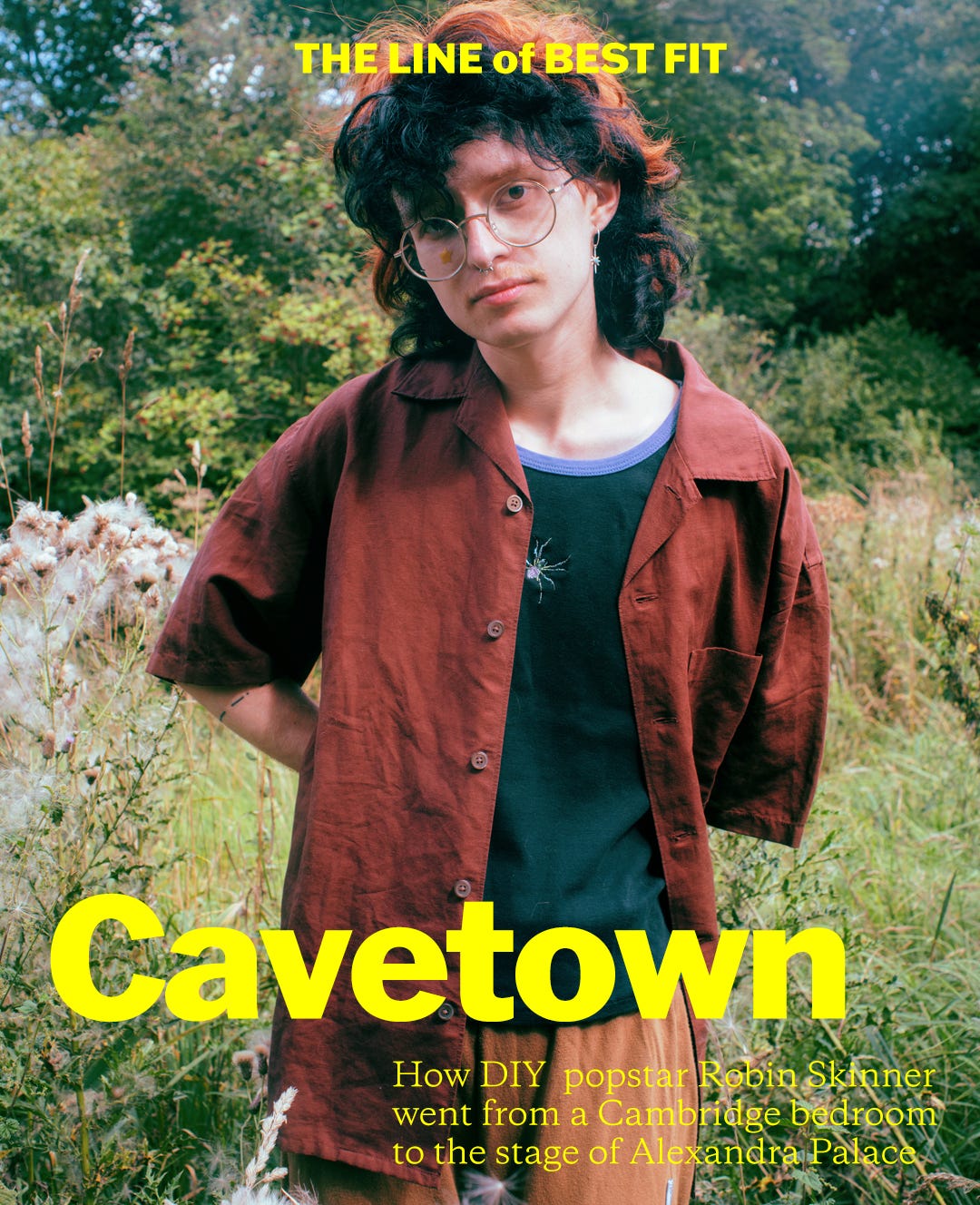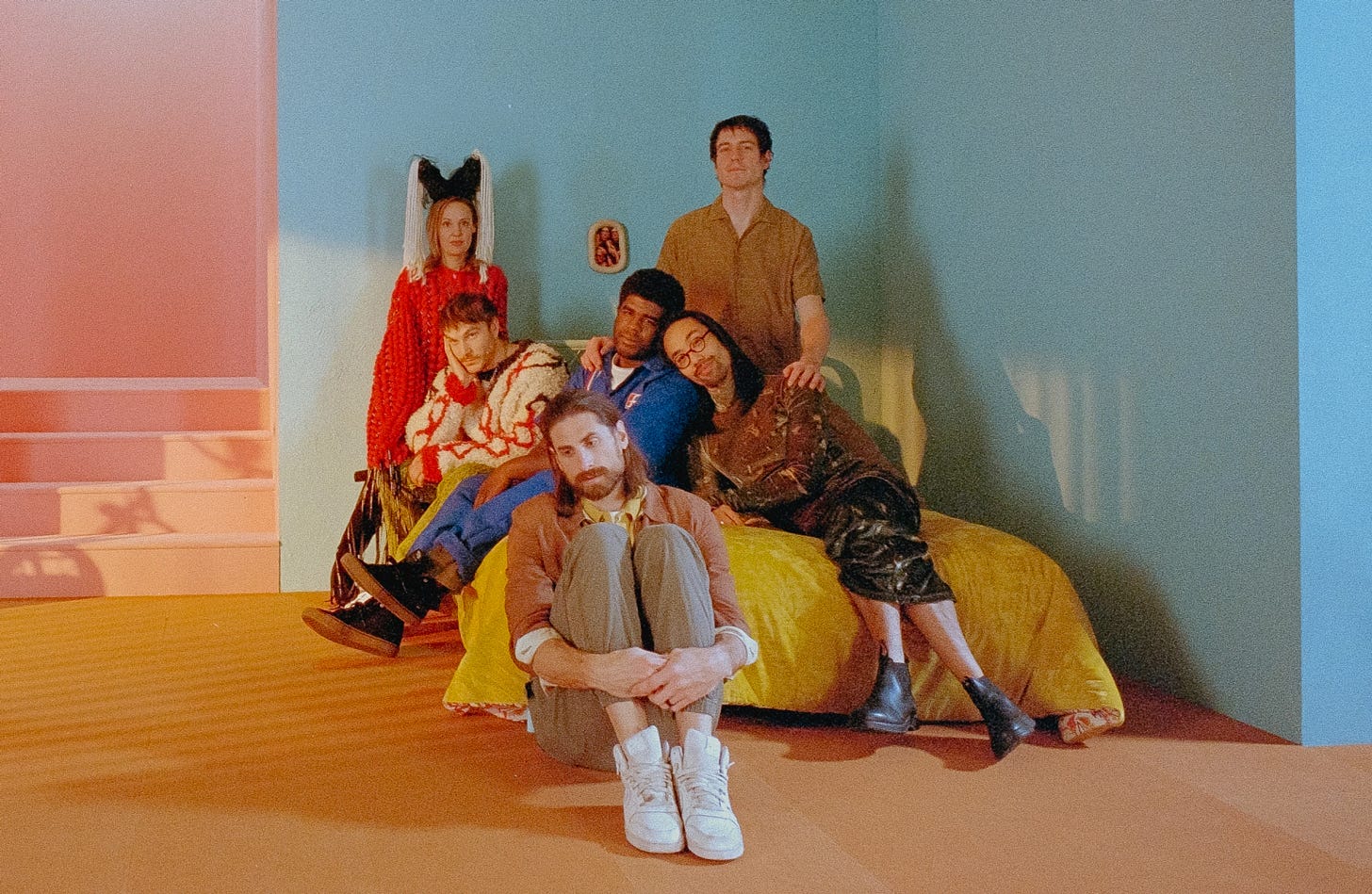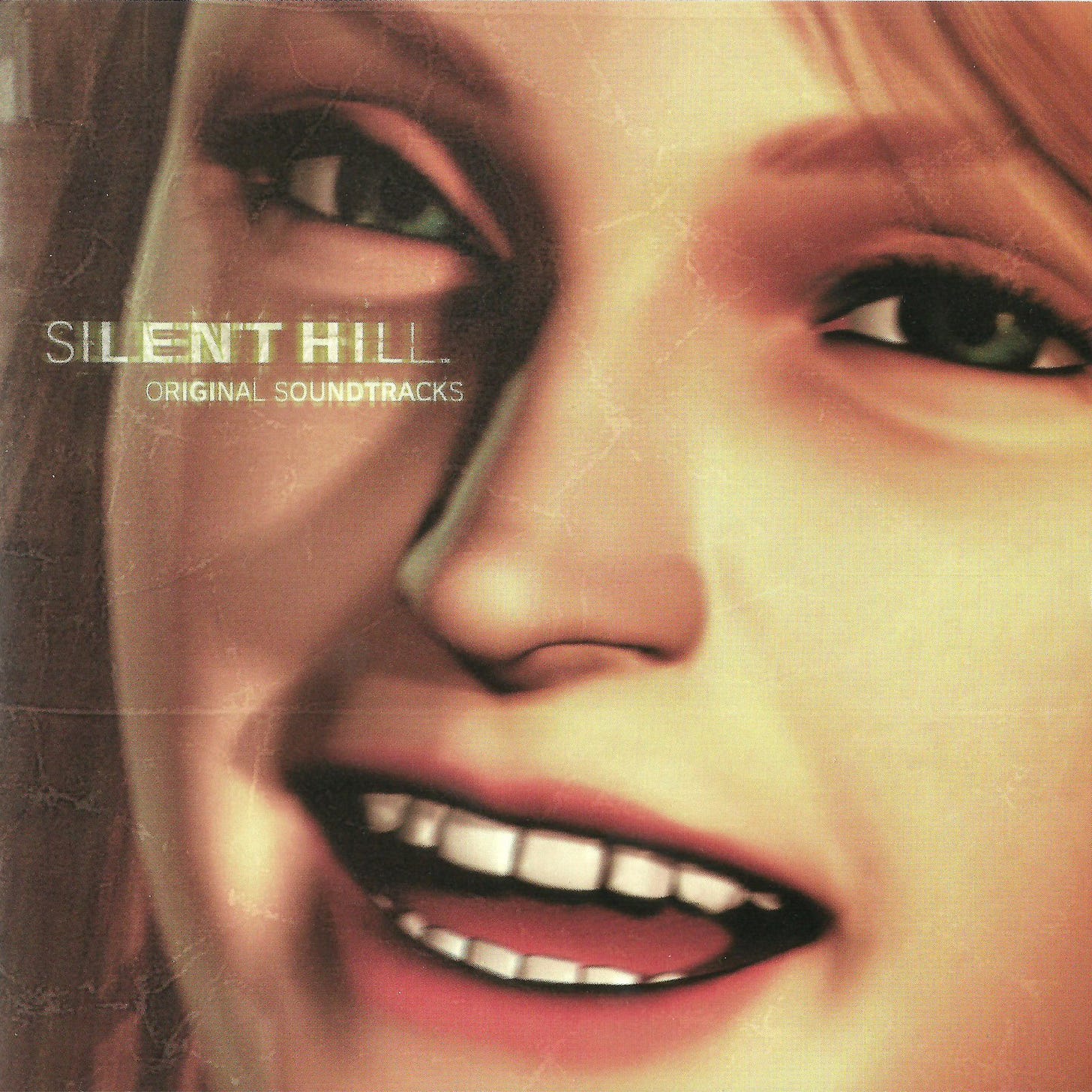Palace Music
A decade since Robin Skinner posted his first original song on YouTube, the life of the 24-year-old DIY popstar – better known as Cavetown – is coming full circle. As he prepares to play to one of England’s most iconic venues, Kelsey Barnes traces Skinner's rise from bedroom to the stage at Alexandra Palace for this week’s digital cover.
“I grew so slowly and steadily and brought people slowly into my team, it’s hard to actually see how I’ve grown,” Skinner admits to Best Fit. “It’s something that I’m grateful for. It's allowed me to grow naturally and figure out what is important to keep the same and what needs to change. I've definitely learnt that over time. Obviously I've gotten more practice with recording and with playing live and I know myself better and what works for me. I've been really fortunate to have a team that wants me to find what works for me and doesn't push me too hard. They want me to keep enjoying what I do.
As a kid, he’d watch The Moomins, a series by Finnish writer and illustrator Tove Jansson, and listen to their audiobooks to fall asleep. To date, Skinner is still soothed by their stories, leaning on them for inspiration (“I really love the art style, the storytelling, and the world building.”) He points out prints of the round fairy-tale characters that adorn his living room walls, telling the story of how he was able to write a song that went into the film soundtrack for The Moomins. After suggesting that the stories that shape us in our most formative years become a part of our intrinsic DNA and, somehow, it becomes a full circle moment, he smiles. “Yeah, that’s a pretty cool thing to think back on. It’s like a part of my childhood finding a way to still be in my life in a different way.”
Rather than solely covering the work by established artists and uploading them instead, Skinner opted to write and upload his own original songs in addition to giving his own spin on tracks by Twenty One Pilots and Pinegrove. It’s a snapshot into Skinner growing up, trying on different hats and figuring out which one worked. “I used to think I was going to be a writer because I loved making my own, but I fell out of love for reading and admittedly haven’t read a book in years,” he laughs. “That eventually transitioned into acting but I realised it was too scary to be on-stage in front of people. The thing that stuck and felt the most fulfilling and helpful for me was music.”
For Skinner, writing music was like writing in his diary — journal entries that became songs that inevitably turned into a timestamp of what was bothering him at the time. In turn, the albums become chapters of his life — a body of work that helps him think back on who he was at the time and whatever form he was, something he describes as a bunch of “past little lives.” “Even if I find the song cringy now, I think it’s interesting to listen back to songs,” he says. “I’ll remember writing the song and everything I was writing about and, at the time, it mattered so much to me. All these things I was thinking about were so painful at the time and now I don’t even care. Maybe the stuff that I'm writing about now that's really painful… Someday I won't care anymore.”
Cavetown plays Alexandra Palace on 24 September. Read the full interview now over on Best Fit.
Rachel and Neil from Slowdive reflect on their lifelong musical relationship
Rachel Goswell and Neil Halstead feel like they always have each other’s backs and theirs is a friendship that continues to endure. “I’m not too sure we truly do have a healthy working relationship,” Halstead notes. “It can be tempestuous, we've definitely had our ups and downs but I think at this point we are more respectful of each other than we might have been and at some points in the past.” Goswell’s response matches this sentiment, citing that distancing themselves at times has helped but since COVID, their working relationship has become easier than ever before.
“It’s funny,” Goswell says, “because honestly, I have no idea what the secret is! I just think when it comes down to it, our voices work so well together when we make music. When you get to your 50s sometimes it feels like it’s a miracle that you’re still alive, and you can appreciate each other a lot more. Hopefully touring can still be fun so we can look back on it when we are old and gray so we can be like ‘remember when we did this?’”
Halstead and Goswell’s working relationship continues to build on a strong foundation, despite times of strain and difficulty. During the Souvlaki tour 30 years ago, the pair called time on their romantic relationship, with many album cuts referencing its demise. “We were struggling a little at that point,” Halstead reminisces, “Rachel and I had split up and we were all trying our best to keep the band together. It was a nightmare for everyone else as much as anything, they were very good about it – but the vibes were not good.”
Admittedly, at the time Goswell coped with the situation by blanking out a lot of what had happened and trying to be as productive as possible, with many moments from that period still firmly locked away in her head. “It just wasn’t a happy time,” she says, “it felt like we had no choice but to do this band and get on with it. When you break up with somebody the last thing you want to do is be in their pocket and you want to get as far away as possible from them, which neither of us could do. There were definitely points where I was a complete train wreck, possibly Neil as well at certain points… it was a long time ago,” Goswell smiles.
The Armed are human after all
Equal parts energised enthusiast and attentive presence, The Armed’s front-man Tony Wolski is as intense as you’d expect. Even during our interview, the 37-year old Detroit-based creative hosts with the same light-hearted wink often found in The Armed’s projects, occasionally erupting into laughter gloriously. It would seem he’s every part the rock-band front person – and indeed The Armed’s, since 2021’s ULTRAPOP.
“That's been a massive adjustment for me, for sure," he admits. Originally the drummer for the outfit, his ascension to the focal point in 2021 also saw the collective physically bolster their look – with many going through strict diet and fitness regimes to become chiselled Adonis’ of the hardcore world. “I don't pretend to be comfortable with it in any degree. I mean, that's probably why for the last album we did this body transformation. It's not an inauthentic representation of myself. It's a representation of what I want to be on stage.”
It’s here the first human signs of The Armed came to light. While by no means a Daft Punk robotic enigma – the very basis of the Armed is an organic collective in every facet including music and visuals. But, being able to ascertain just what this all came to be and mean to its key players, has always been a question mark hanging in the air.
Wolski readily admits that "the idea of being unabashedly sincere and immediate with people is something that is new to us and it is scary.” Their fifth outing, Perfect Saviors is as immediate and vitalised as they’ve sounded. Previously hiding their melodies behind a wall of white noise, Wolski confesses, "we've always made records that not only reward multiple listens, but frankly, require them.” But for album five, it’s all on the table. Lyrics can be deciphered, the hooks knock you over with the force of a studious roundhouse kick – it’s the Armed’s most accessible, and by this, most open, album to date.
“But it is less scarier than it's ever been before because when you hit a certain age...I have a four year old who doesn't give a shit about any of this,” Wolski laughs. "You just stop caring! And I don't mean that in the wrong way. I care about it from a quality perspective more than ever – I just don't give a fuck what anyone thinks anymore. That was a running theme for it.”
Something Old, Something New
Every week, one of Best Fit's writers or editors share their recommendations of two records they love - one from the past, one from the present. This week, Best Fit writer Noah Barker on Akira Yamaoka’s soundtrack to Silent Hill 2, and Haunted Mountain by Big Thief’s Buck Meek (2023).
I’ll preface with a promotion; Akira Yamaoka, the composer and sound designer for the first two Silent Hill games was upgraded to producer based on the sheer fact that the OSTs to the games are more integral than the stories themselves. An under utilised mechanism of soundtracks in games is to so thoroughly dominate the vibe and aesthetic of the experience that it is one’s first thought after completion. The OST is unendingly morose and punishing, yet dreamlike to the most surreal degree. Studying the ambient works of the 90s and the industrial of Nine Inch Nails, Yamaoka crafts a tightly paced, holistic record as the game's backbone- and soul. On its own accord, it deftly combines the dreaminess of 90s ambient with the eclectic variety of a film score.
Like a wine pairing, it’s most effective in the context of its work, yet striking in its variety. Ambient themes ripple and groan like unearthly creatures and sudden forays into trip-hop elevate the dream at key moments. Themes, like “Theme of Laura” & “Promise (Reprise),” are as emotionally draining and cinematic as the work they soundtrack. “The Reverse Will,” with its expansive use of samples and bright psychedelics, and “Blank Fairy” with its cycling purgatorial drone, are instances of unmatched creative sound design, especially for the supposed pedigree of video game OSTs. The incorporations of rock instrumentation leading into the closer “Promise” are so excellently produced and layered that they could have arisen from any number of Josh Homme-produced records a decade on. It is a finely tuned record of inventive synth work and inspired sampling, meaning as much in the context of its work as it does on its own merit, 20-odd-years later.
Gentleness isn’t the vice it used to be. As art moves from modernist to post-modern, and finally taking a bow at meta-modern, it’s worth noting that many artists reject all of this theorising in favour of just writing a happy song every now and then: rebelling in that soft simplicity of a Summer daze wrapped in nostalgia. Whether the famed guitarist needs an introduction at this point is directly proportional to how often you spend in the woods; if the skin on your back is the type of tanned indicative of field-working and van-living, then Meek is your Jerry Garcia. On Haunted Mountain, he more than accomplishes the end-of-Summer dreaminess he’s been pining for these last few years.
Although not produced by James Krivchenia, Haunted Mountain retains the percussive, folksy warmth of last year’s masterful Dragon New Warm Mountain I Believe in You, leading this solo outing, in the most flattering way possible, as a welcome addendum. “Haunted Mountain,” “Cyclades,” and “Where You’re Coming From,” are raucous folk jams imagining a world where Bob Dylan never evolved from Nashville Skyline, but a pleasant world that would be. “Lullabies” and “Paradise” share in the tenderness longtime collaborator Adrianne Lenker conjures on her own solo work, but this may be missing the point. If one is just a voice in the context of another, that voice being on its own should not be alien, it should be leaned into with ready ears. You’re not hearing the backup singer, you’re hearing the collaborator join forces with himself.
Listen to the week in new music by following our Discovery playlist
Dropping at midnight every Thursday, follow our 20-track playlist for a taste of the best new music from the most exciting breaking artists.
These are the songs our editors and writers have on repeat right now, taken from the hundreds of tracks released in the last seven days. Leading the selection this week are amazing cuts from Sarah Meth, Ratbag, Grace Acladna, Eartheater, and coverstars Lilo.










